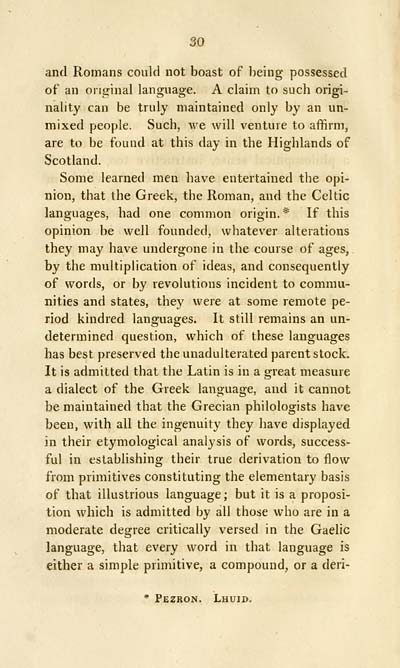Download files
Complete book:
Individual page:
Thumbnail gallery: Grid view | List view

30
and Romans could not boast of being possessed
of an original language. A claim to such origi-
nality can be truly maintained only by an un-
mixed people. Such, we will venture to affirm,
are to be found at this day in the Highlands of
Scotland.
Some learned men have entertained the opi-
nion, that the Greek, the Roman, and the Celtic
languages, had one common origin.* If this
opinion be well founded, whatever alterations
they may have undergone in the course of ages,
by the multiplication of ideas, and consequently
of words, or by revolutions incident to commu-
nities and states, they were at some remote pe-
riod kindred languages. It still remains an un-
determined question, which of these languages
has best preserved the unadulterated parent stock.
It is admitted that the Latin is in a great measure
a dialect of the Greek language, and it cannot
be maintained that the Grecian philologists have
been, with all the ingenuity they have displayed
in their etymological analysis of words, success-
ful in establishing their true derivation to flow
from primitives constituting the elementary basis
of that illustrious language ; but it is a proposi-
tion which is admitted by all those who are in a
moderate degree critically versed in the Gaelic
language, that every word in that language is
either a simple primitive, a compound, or a deri-
* Pezron. Lhuid.
and Romans could not boast of being possessed
of an original language. A claim to such origi-
nality can be truly maintained only by an un-
mixed people. Such, we will venture to affirm,
are to be found at this day in the Highlands of
Scotland.
Some learned men have entertained the opi-
nion, that the Greek, the Roman, and the Celtic
languages, had one common origin.* If this
opinion be well founded, whatever alterations
they may have undergone in the course of ages,
by the multiplication of ideas, and consequently
of words, or by revolutions incident to commu-
nities and states, they were at some remote pe-
riod kindred languages. It still remains an un-
determined question, which of these languages
has best preserved the unadulterated parent stock.
It is admitted that the Latin is in a great measure
a dialect of the Greek language, and it cannot
be maintained that the Grecian philologists have
been, with all the ingenuity they have displayed
in their etymological analysis of words, success-
ful in establishing their true derivation to flow
from primitives constituting the elementary basis
of that illustrious language ; but it is a proposi-
tion which is admitted by all those who are in a
moderate degree critically versed in the Gaelic
language, that every word in that language is
either a simple primitive, a compound, or a deri-
* Pezron. Lhuid.
Set display mode to: Large image | Transcription
Images and transcriptions on this page, including medium image downloads, may be used under the Creative Commons Attribution 4.0 International Licence unless otherwise stated. ![]()
| Early Gaelic Book Collections > Ossian Collection > Thoughts on the origin and descent of the Gael > (42) |
|---|
| Permanent URL | https://digital.nls.uk/82234948 |
|---|
| Description | Selected books from the Ossian Collection of 327 volumes, originally assembled by J. Norman Methven of Perth. Different editions and translations of James MacPherson's epic poem 'Ossian', some with a map of the 'Kingdom of Connor'. Also secondary material relating to Ossianic poetry and the Ossian controversy. |
|---|
| Description | Selected items from five 'Special and Named Printed Collections'. Includes books in Gaelic and other Celtic languages, works about the Gaels, their languages, literature, culture and history. |
|---|

